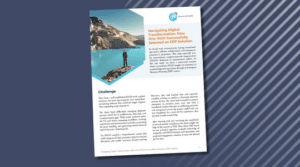February 22, 2024
Navigating Digital Transformation
In virtual work environments, having streamlined operations, efficient collaboration, and transparent processes is paramount. This rings especially true for international nongovernmental organizations (INGOs) dedicated to humanitarian efforts. In this case study, we share a real-world scenario where a prominent INGO sought our assistance in modernizing their operations through an Enterprise Resource Planning (ERP) system.
Challenge
Our client, a well-established INGO with a global presence, had been operating for years using basic accounting software that could no longer support their expanding scope of projects.
The client faced difficulties managing disparate systems, which led to inefficiencies, data silos, and communication gaps. With teams scattered across the US and Africa, managing workflows, tracking requisitions and procurement activities, accounting for grant funding, and generating useful financial reports became a daunting task.
The INGO needed a comprehensive system that could integrate all their processes, improve resource allocation, and enable real-time decision-making. However, they had limited time and expertise available in-house to conduct a thorough selection process. In fact, the client had attempted a systems assessment in previous years, even met with a handful of vendors, but due to conflicting priorities and unexpected events the project stalled and was not completed. As a result of this experience, they decided to seek outside help.
After meeting with and reviewing the capabilities of several outside consultants, the client sought the help of the experts at GRF. They chose GRF based on our technical expertise, in-depth knowledge of nonprofit and INGO finances and operations, and proposed engagement timeline to meet the desired go-live date.
Solution
Our risk experts take a client-centric approach and assist in complex decision-making over a wide range of business and financial issues. In this case, we worked closely with our client’s various stakeholders to understand their unique challenges, developed a list of system requirements, and then used our knowledge of technologies and risks to provide a system recommendation. Our process involves the following steps:
Capability Mapping Exercises:
- Conducted in-depth sessions with key stakeholders to identify core business processes.
- Mapped existing workflows to pinpoint pain points and opportunities for improvement.
- Gained an understanding of potential future changes (i.e., exploring new CRM system, change in banking partners in Africa) to ensure appropriate selection of potential vendors that will align with current system infrastructure and desired future state.
- Identified “must haves” (i.e., multi-currency and consolidation capabilities for day-to-day accounting activity, budgeting, financial planning, and analysis) that would preclude certain vendors from selection.
Research User Reviews:
- Analyzed user reviews of various ERP solutions to gain insights into user satisfaction, challenges, and success stories.
- Prioritized solutions with positive feedback and a proven track record in similar industries.
Vendor Meetings:
- GRF facilitated the process of making initial contact with vendors, performing scoping calls, and scheduling demos. This reduced the time commitment required by the client and ensured the engagement stayed on track within the pre-defined timeline.
- Engaged with multiple ERP vendors to understand their offerings, customization options, and implementation processes.
- Ensured vendors understood the client’s unique needs and could tailor solutions accordingly.
Scoping Calls:
- Conducted scoping calls with shortlisted vendors to delve into specific features, integration capabilities, and potential challenges.
- Aligned vendors’ offerings with the client’s long-term vision.
Pricing Quotes:
- Obtained detailed pricing quotes, ensuring transparency and avoiding hidden costs.
- Assisted the client in evaluating the overall cost of ownership, including implementation, training, and ongoing support.
Results
Within the agreed-upon 8-week timeline, our team met with 5 different vendors, performed detailed scoping calls, and presented the client with a comprehensive evaluation.
We assessed each system based on a variety of factors, including capabilities, user friendliness, integrations with supporting financial applications, and pricing. This gave the selection committee the information they needed to make an informed decision in selecting their new ERP system, setting the organization on the right path for digital transformation.
Conclusion
Through a comprehensive current state evaluation and streamlined internal controls, the INGO has positioned itself for significant improvements in organizational efficiency. The INGO selected a new system that will provide them with improved collaboration, workflows, and data accessibility, positioning the organization for success as they continue to grow. Using an outside consultant enabled our client to make an informed decision while still able to focus on their day-to-day responsibilities and other critical initiatives.
The nonprofit organization featured in this case study is a client of GRF CPAs & Advisors but asked to remain anonymous.
The GRF Advantage
Objective Analysis:
The client received an unbiased evaluation of ERP solutions, ensuring decisions were based on needs rather than vendor influence.
Time and Resource Savings:
With a streamlined selection process, the client saved significant time and resources that would have been spent navigating the complex ERP landscape on their own.
Customization Alignment:
The client had assurance that the chosen ERP solution would align seamlessly with their unique workflows and processes, maximizing effectiveness.
Risk Mitigation:
Having risk management experts conduct the assessments helped the client identify potential risks early, enabling them to make informed decisions and proactively mitigate challenges.
GRF Can Help
Our Risk & Advisory Services team assists clients in understanding their mission-critical risks and developing practical solutions for managing them. The team consists of subject matter experts across a range of fields including, finance, accounting, fraud and forensic auditing, information technology and cybersecurity, and US government funding compliance – enabling us to provide a holistic approach to your systems assessment projects. We keep abreast of state-of-the-art industry trends and best practices, maintaining industry certifications in a broad range of risk fields, including internal audit, enterprise risk management, cybersecurity, information systems, and fraud investigations.
Contact Us
For more information, contact us online, or reach out to our experts at the contact info below.


